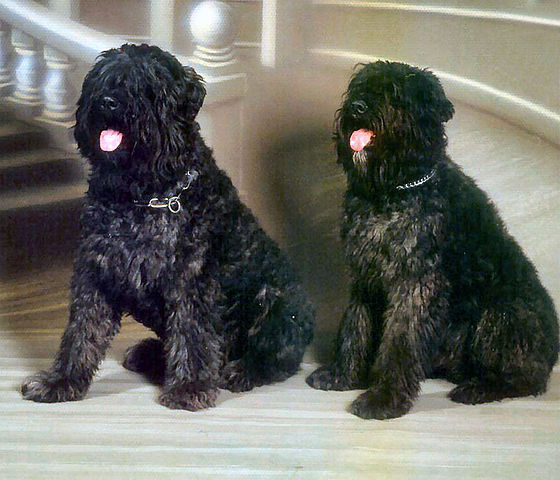The Bouvier des Flandres is a rugged Belgian herding and farm dog. Although he requires a lot of exercise and outdoor space to thrive, he does not do well as an outdoor-only dog (this is a velcro breed that wants to follow you wherever you go). He is extremely loyal and loving of his owners and his alert and fearless nature ensures he will protect his owners when he feels it is necessary. Despite his courageous nature (and sometimes outwardly intimidating appearance), this is actually a gentle dog with a calm, even temperament.
Bouviers are incredibly intelligent and often tasked with some of the harder jobs in canine-dom. Not only do they make excellent companions but they also excel in police work, as guide dogs for the blind and as hearing dogs for the deaf! Some work as drug detection dogs while other work to herd sheep on farms. If started young, the breed is eager to please and have great attention spans. While a trained Bouv is a dream to live and work with, and untrained one can be a disaster. The breed tends toward being assertive and unruly if not given structure, rules and boundaries. This, combined with his brute strength and size means that he can quickly rule the household. Obedience training is an absolute must with this breed!
The look of the Bouv is very distinct and unique, and many people are interested in purchasing one simply based on looks. A prospective owner should be warned, however, that a lot of work goes into getting the dog to look that way! The “natural look” of the Bouv is a shaggy dog that more often has leaves and other outdoor remnants hanging from the coat (a nightmare for fastidious housekeepers). The beard is often wet and/or messy with food or mud. In fact, the Dutch nickname for this breed is “dirty beard”! One must be prepared not only to groom the dog regularly, but also to be ok with the dog looking less than perfect on a rainy day. Also, although the breed technically sheds very little, all that coat has to come out somehow and it does so when you brush the dog – sometimes resulting in mountains of hair! Brushing should be done 2-3 times a week, and will take roughly 20 minutes each session.
The Bouvier can have a very strong prey drive and not all of them are able to live with cats. Some are ok if they are raised with them but this is the exception rather than the rule. This means that they are not usually well-suited to living in cat homes. They are also not suited to living with people on a limited budget – these dogs eat a lot, have more expensive vet bills than smaller breeds, and cost a lot to be professionally groomed (if the owner isn’t willing to do it).
While the Bouvier des Flandres loves his owners more than anything else in the world, he does not show it outwardly – at least not enthusiastically. This is not the type of dog that will jump into your lap and lick your face for hours at a time. Instead, most prefer just to be in the same room with you, quietly loving you. While they can be playful (particularly as puppies), they are more likely to be serene and calm. They are usually quite empathetic as well, and pick up on your emotions. If you are angry, sad or overjoyed, they might just mimic your sentiments.
The Bouv needs regular exercise! A yard will usually not cut it as most Bouvs are somewhat lazy about exercising themselves. It is up to the owner to make sure he gets out and fulfills this vital need. One mile a day, twice a day, is usually sufficient – so an owner must be able to provide this on a regular basis. This is not to say that a yard serves no purpose, as most Bouvs will meander and explore the yards – thus also fulfilling them mentally, but it is not enough. Note about yards: a fence is strongly recommended because even though the breed is less likely to wander than some other breeds, they will chase other animals, bikes or cars right off the property!
The Bouvier des Flandres, like all dog breeds, needs socialization. This said, the Bouv needs more than most other breeds. Whether rain or shine, the puppy must encounter as many people, animals and places as possible within the first few months of his life. Without this critical component, the dog could end up being unnaturally shy or even outright aggressive. This is so important that novice owners are told to steer clear of this breed in favor of an easier-to-raise dog!

Photo CC BY-SA 3.0
